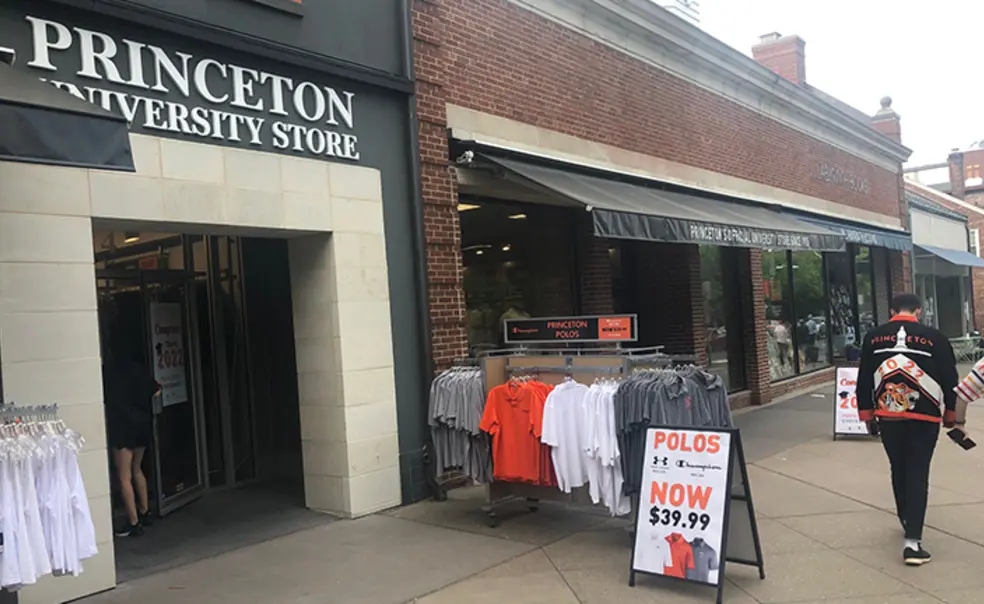Supply-Chain Problems Have Reached Princeton Stores
Out-of-stock cereals, Ritz crackers, and allergy medications are just a few of the products customers may have been missing in the Princeton University Store over the weekend.
“For a while, we were out of toothpaste and feminine items,” said Jim Sykes, president of the U-Store. “Lately we’ve had trouble getting ice cream. We’re out of 20-25 percent of the flavors.”
With global supply-chain disruptions due to COVID-19, worker strikes, and the crisis in Ukraine, campus convenience stores and food markets are having as much difficulty keeping their shelves fully stocked as larger New Jersey grocers. “In comparison to Wegmans and McCaffrey’s, we’re small,” Sykes said. “But there are large disruptions in the supply chains that filter down to people like us, maybe a little bit differently.” The U-Store’s repertoire of Princeton merchandise is no less affected, he was quick to add: T-shirts and sweatshirts take two or three months to ship to the store, Sykes explained, which puts a premium on forecasting customer preferences months in advance.
At the end of an academic semester, which items are sold out in the U-Store seem to reflect student eating habits and health patterns. Shelves once teeming with ramen noodles, sandwich bread, or single-serve Kellogg’s cereal cups sit eerily empty. Pedialyte products are running low, and in April, cough and flu product sales nearly quadrupled. Unpredictable surges in seasonal allergies and illness towards the end of the spring semester made upticks difficult to predict, Sykes said. Customers emptied shelves faster than over-the-counter medications could be replaced.
According to Audrey Braam, the wellness manager at Nassau Street’s Whole Earth Center — Princeton’s oldest natural foods grocer — these product depletions are not universally an issue of product shortage. Distributors might not have enough workers in a particular warehouse, so the order gets scrapped. There might be an issue with the raw material or the packaging. Other times, the vendors even have sufficient product, but not enough drivers to deliver it. Customers can’t find their go-to products, sales decrease, and as buyers increasingly look to online venues such as Amazon — which are depleted themselves — local markets struggle to get customers in the door.
“We have certain cereals that we have not been able to get in six months,” Braam said. She added that recent invoices for grocery, refrigerated, and frozen items have several pages of “out of stock” products. “It used to be maybe half a page. We’re getting the bare minimum.”
Low-stock specialty items are especially problematic for those with medical dietary restrictions, such as food allergies or celiac disease, for which procuring an allergen-free or gluten-free cereal item isn’t always a desire but a medical necessity.
On the other hand, the simple wants of some hungry students studying for finals can prompt a desperate shopping search if the U-Store is out of cheesy snacks, or the Wawa doesn’t carry its stuffed pretzels. “I was looking for Flaming Hot Cheetos,” Jeremiah Giordani ’25 said. “I had to go to five different stores in order to find them.” Hannah Faughnan ’23 looks outside of New Jersey for her favorite out-of-stock snacks, asking friends in Texas to send them to her.
Back at the U-Store, Sykes explained that food vendors have concentrated on manufacturing the products that are most important, eliminating the exotic or unusual flavors. He’s been pleasantly surprised at the community’s support and understanding of the supply-chain disruptions. “People are seemingly more in tune to find another style,” Sykes said. “The business has not been as negatively impacted as I would have thought.”
Not all customers are happy to make swaps, though. An appearance of cooperation may actually be a reluctant acceptance of the uncontrollable. Thomas McBride ’22, who typically orders the applewood smoked bacon wrap from the Wawa app, said that reading the words “item currently unavailable” is “a demoralizing sight after a hard round of studies.”












No responses yet